Rock garden ideas – 20 ways to create a stylish rockery in your backyard
Whatever size your space, these rock garden ideas will make a stunning feature, and enable a variety of plants to thrive

Melanie Griffiths
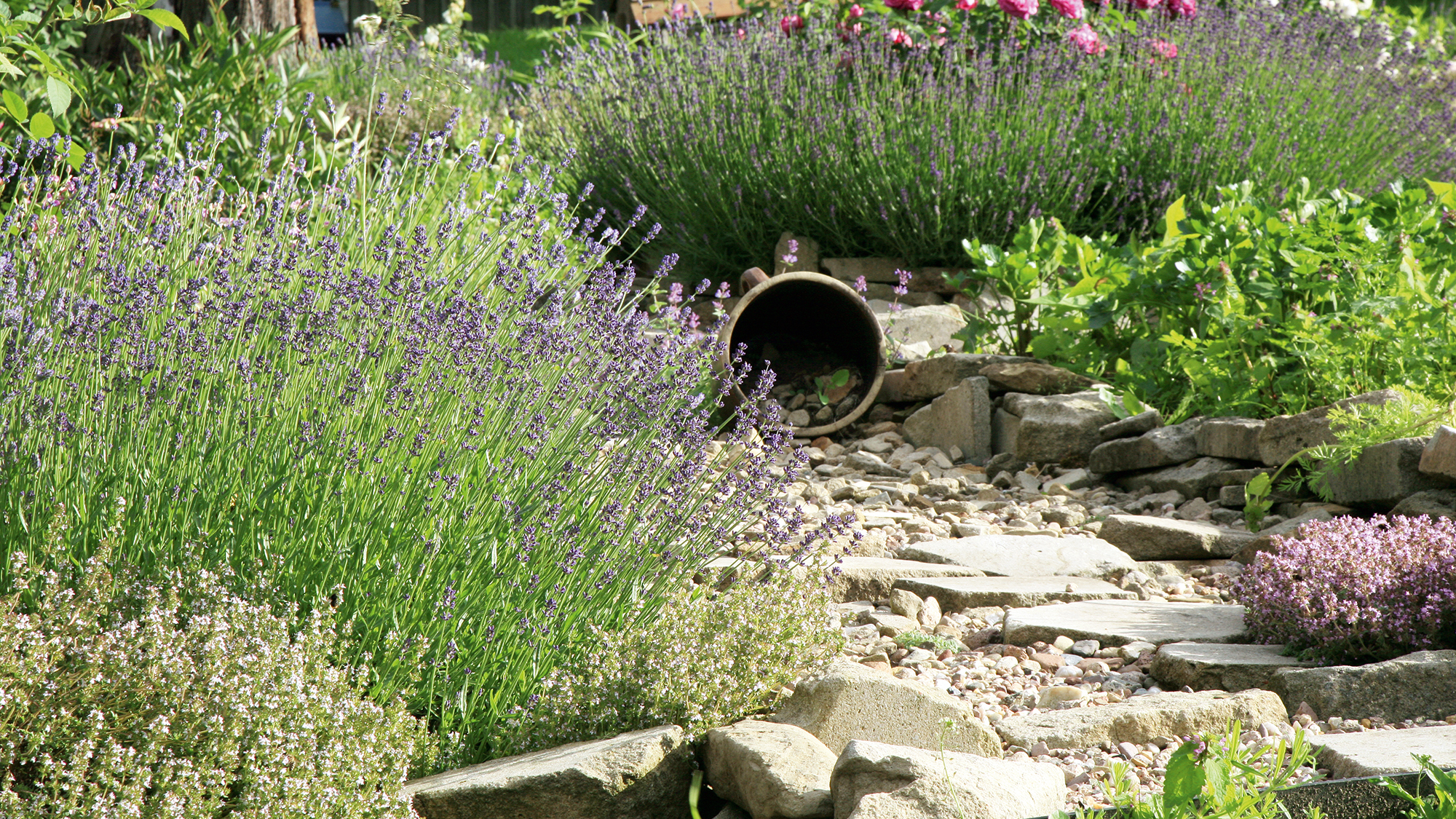
There are so many wonderful rock garden ideas that will enable you to create a beautiful rockery – however big or small your garden.
Adding a rockery is one of the best backyard landscaping ideas to add interest to a design, but has many other benefits too.
'Planting a rock garden is the best way to turn a potential eyesore into an oasis of beauty and life,' says Marjorie Beausoleil, founder of Ethos Seed Company.
'Rock gardens are a fact of life in many areas, such as my native New England, because of the extremely rocky terrain most houses are built on. Maintaining a lawn around these areas makes for strenuous work, often with poor results.
'Landscaping ideas with rocks can be used to create a focal point in an area that would otherwise be forgotten, or worse, invaded by weeds.'
It's also a brilliant solution for areas prone to drought, as many popular rock garden plants are well suited to a drier climate.
Learn how to build a rockery, and in no time at all you will create a stunning landscaping feature in your backyard.
Design expertise in your inbox – from inspiring decorating ideas and beautiful celebrity homes to practical gardening advice and shopping round-ups.
Rock garden ideas
These wonderful rock garden ideas will provide all the inspiration you need to start creating your very own rockery, or incorporating elements of this aesthetic into your flower bed ideas.
1. Integrate steps into your rock garden
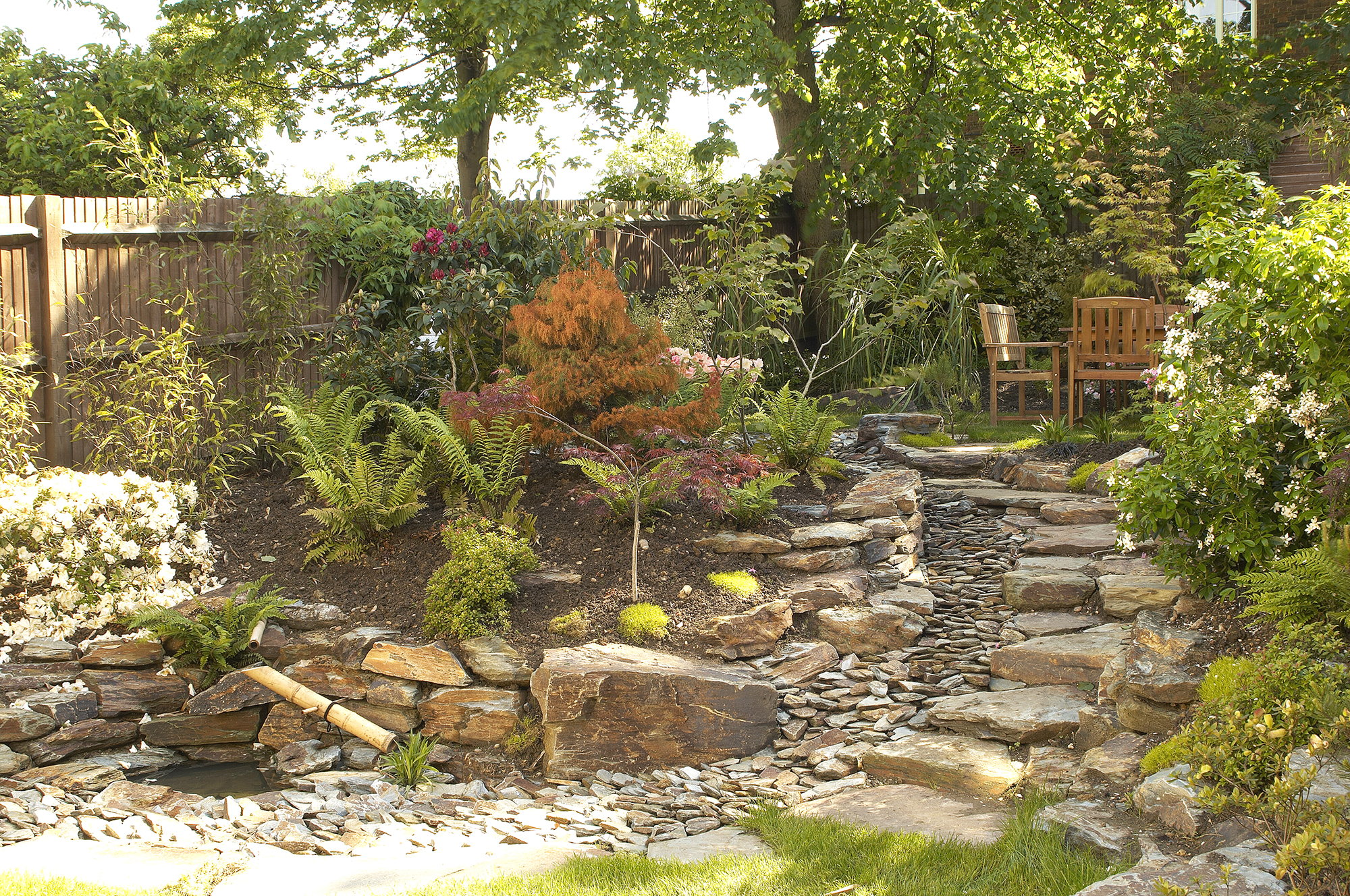
Stone steps are a natural extension of a rockery, and help to make the overall scheme feel more harmonious. This is also a particularly good solution if your yard slopes.
When adding steps to a garden, it is important that the stones have a rougher, or more riven texture, to ensure the surface is non-slip.
‘Any stone that is too sleek when it rains or too sharp for safe general maintenance should be avoided. Stones like limestone or granite typically serve better and are also visually pleasing,’ says Mark Feldman, chief home officer at Riverbend Home.
Annually clean the steps to remove any algae, which can make the surface feel very slippy when it rains.
In this design, the garden is set over two tiers, with a secluded dining area to the upper section. The scheme plays with scale, mixing larger boulders and mid-size rocks with a border of smaller stones that leads the eye upwards.
2. Choose drought-tolerant plants
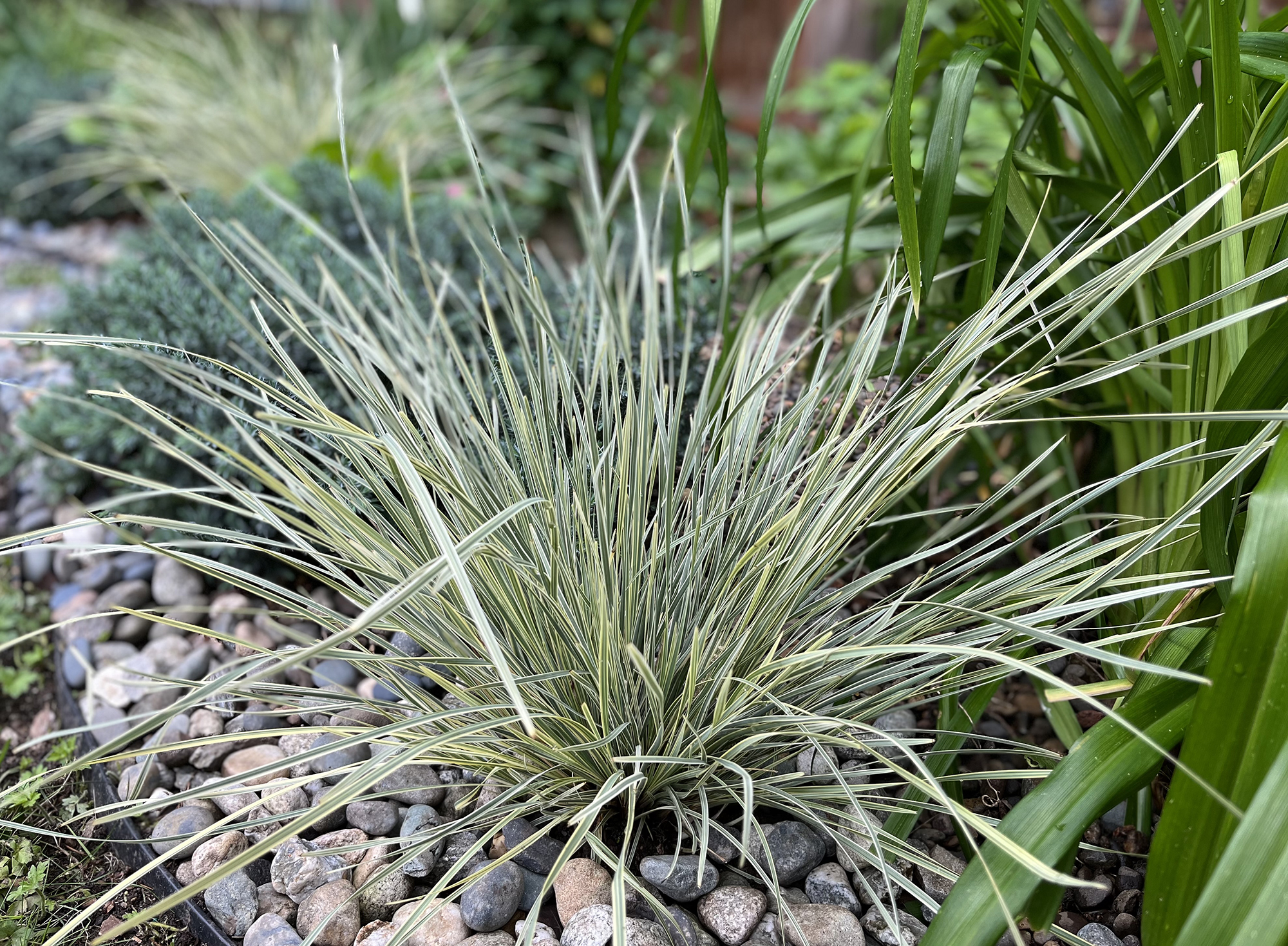
Rock gardens are the ideal solution for warmer climates and areas prone to drought. But you need to choose the right greenery to make it work, focusing on drought-tolerant planting.
'At a time when conserving water has never been more urgent or responsible, rock gardens are a phenomenal way to achieve a high-impact look while saving this important resource,' says Misilla dela Llana, author of Four-Season Food Gardening, who partnered with Sunset Plant Collection to create her rock garden.
'Plants’ textures and movements really pop when placed against the dramatic backdrop of rocks. For my garden, we selected various drought-tolerant plants that complemented each other. Platinum Beauty Lomandra made a beautiful addition with its eye-catching variegated leaf blades.
'Other plants in my rock garden include hens and chicks and other succulents, daylilies, bearded iris, aquilegia, Serbian bellflower, juniper, and bergenia.'
3. Use a rock garden to highlight a stream or pond
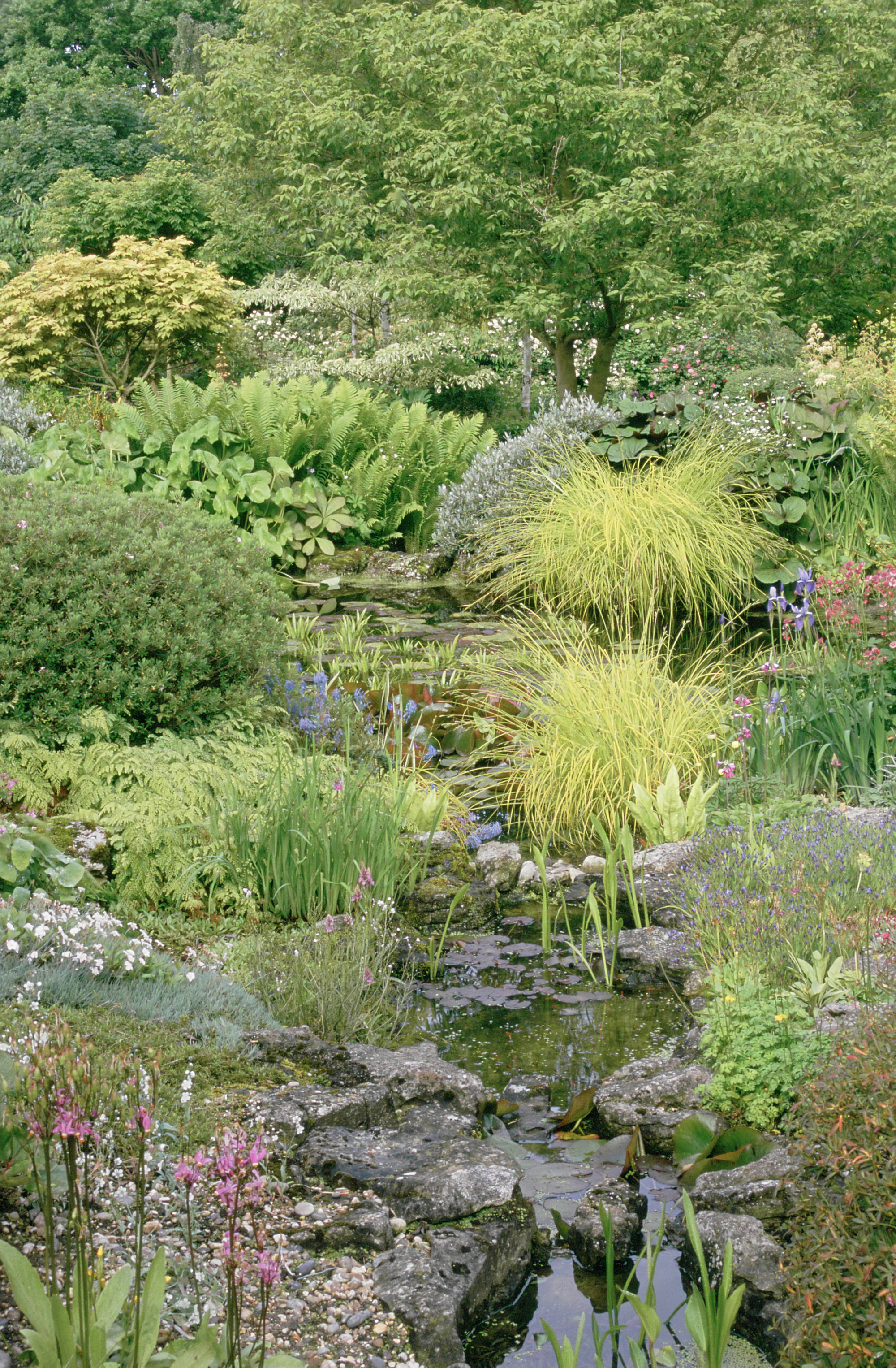
Whether you are fortunate enough to have an existing body of water in your backyard, or are looking for garden pond ideas to add to your design, a rock garden is the perfect way to highlight it and make it feel like an integral part of your scheme.
While most rock gardens are compatible with drought-resistant plants, when planting on the banks of a waterway, you may need to look at plants that will thrive in wetter conditions, especially if the soil is prone to going boggy
This design is bordered by a stunning mix of low-maintenance plants, including ornamental grasses, ferns, irises and rosemary.
4. Plant a herb garden rockery
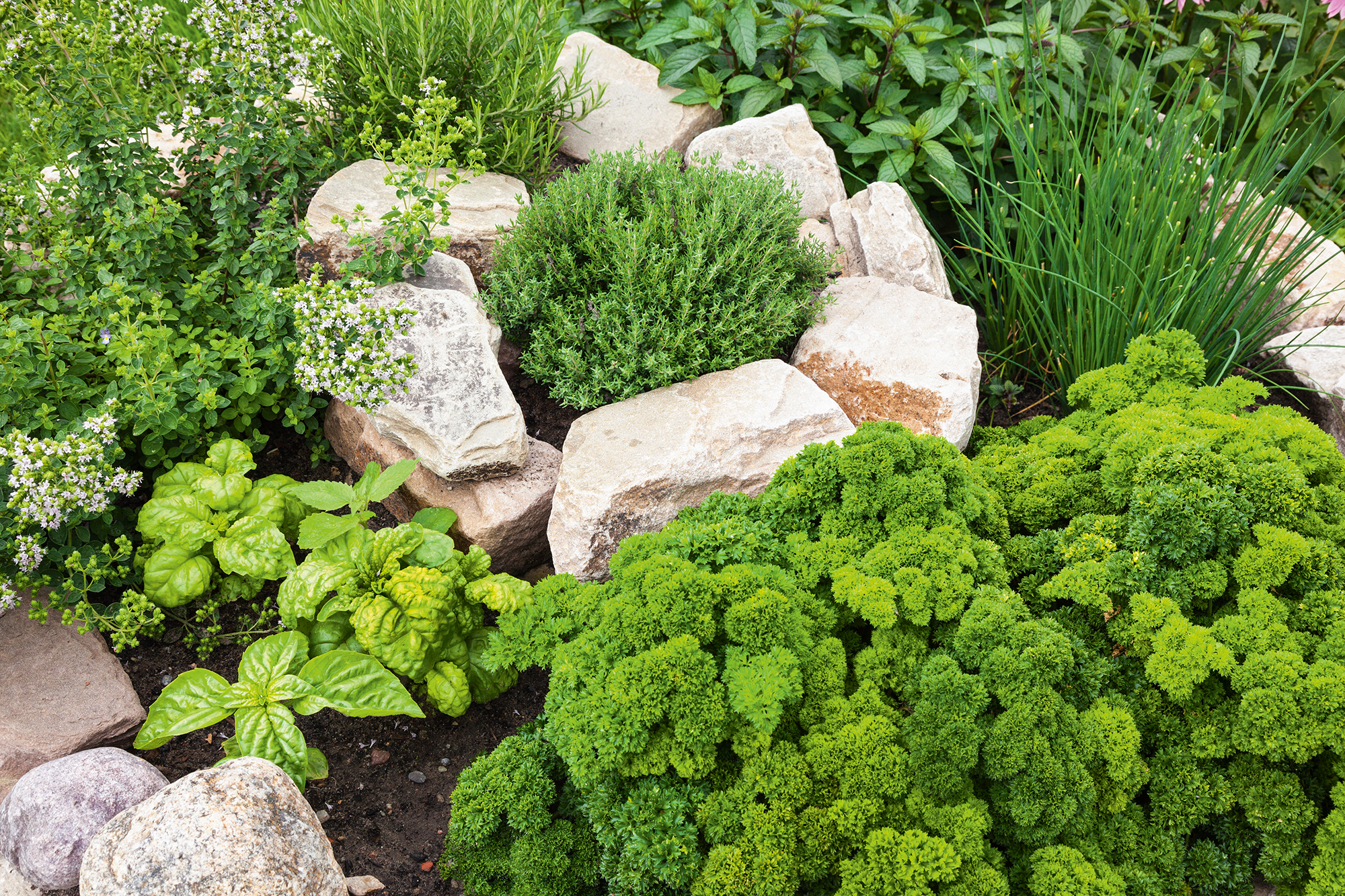
Add an aromatic herb garden to your rockery for a scheme that is both beautiful and useful. ‘Some culinary herbs make great choices for rock gardens because of their ability to thrive in poor conditions,’ says Marjorie Beausoleil.
‘The iconic thyme, which thrives in rock gardens, fills the space near the edges, dripping down gracefully and providing the gardener with a refined herb for the kitchen as well. I also love to grow Greek oregano, chives and sage in my rock gardens, as their blooms are particularly lovely and their foliage attractive.’
There are so many wonderful herb garden ideas to make this a productive space – but it’s best to focus on low-maintenance perennial varieties.
Marjorie also points out that fragrant herbs are also mosquito repellent plants – this works best if you rub the foliage between your fingers when passing.
5. Break up a large lawn with rockeries
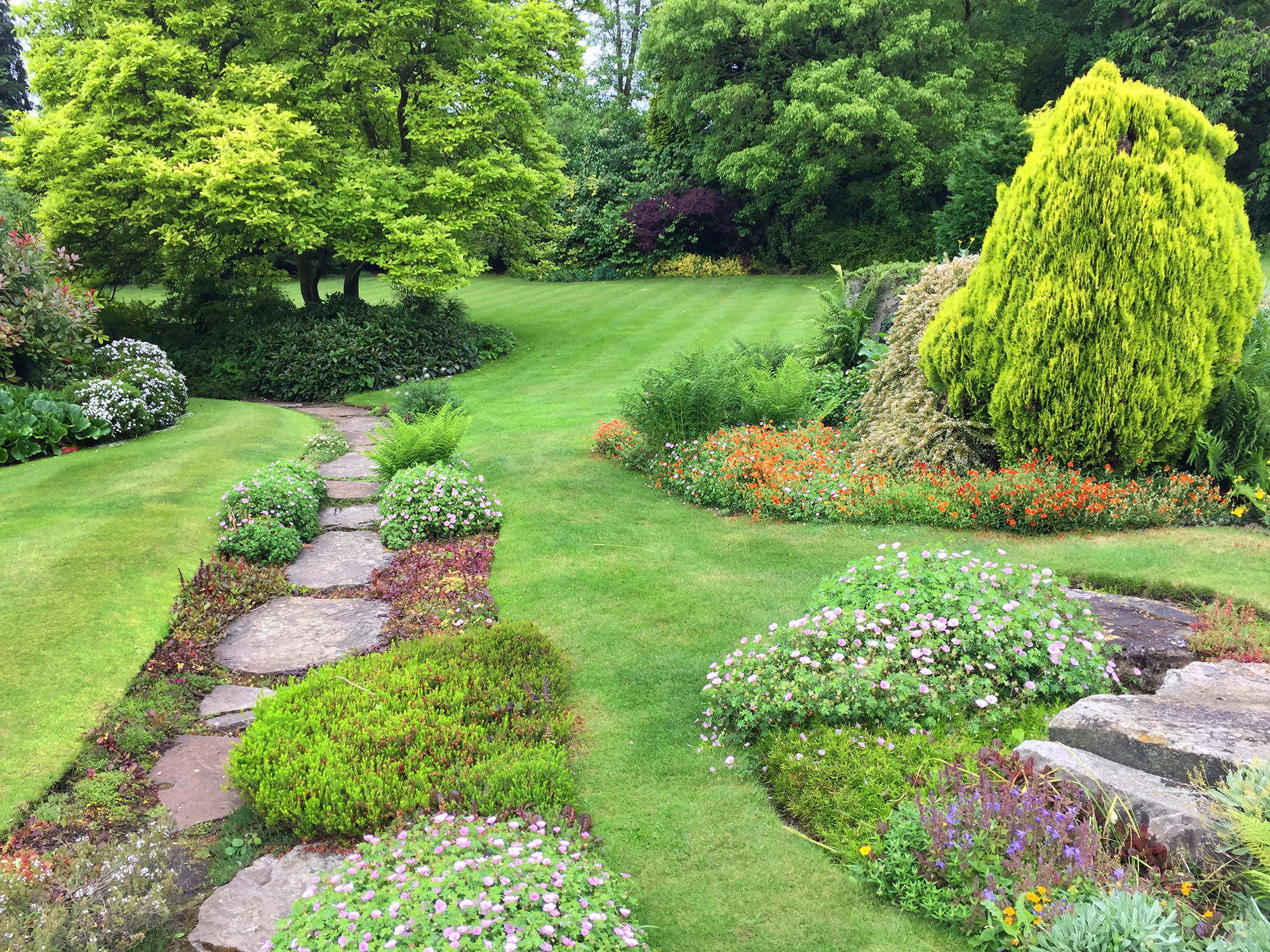
If your yard has a large lawn, then adding rockeries is a great way to break up the expanse, and will add height to different areas.
Larger rocks will be better suited to a big space, acting as eye-catchers – or focal points – on the landscape.
Rocks are also used in some of the best garden path ideas, and look fantastic bordered by alpines, succulents or low-growing shrubs.
Think about the mature height of the plants you use, and how different varieties will work together. 'Focus on tall, stately plants on the back of your rock garden, then go with shorter and shorter plants toward the front,' says Marjorie.
'Use a variety of texture and colors, but try to keep to a single palette for harmony.'
6. Create a zen garden to mimic waves
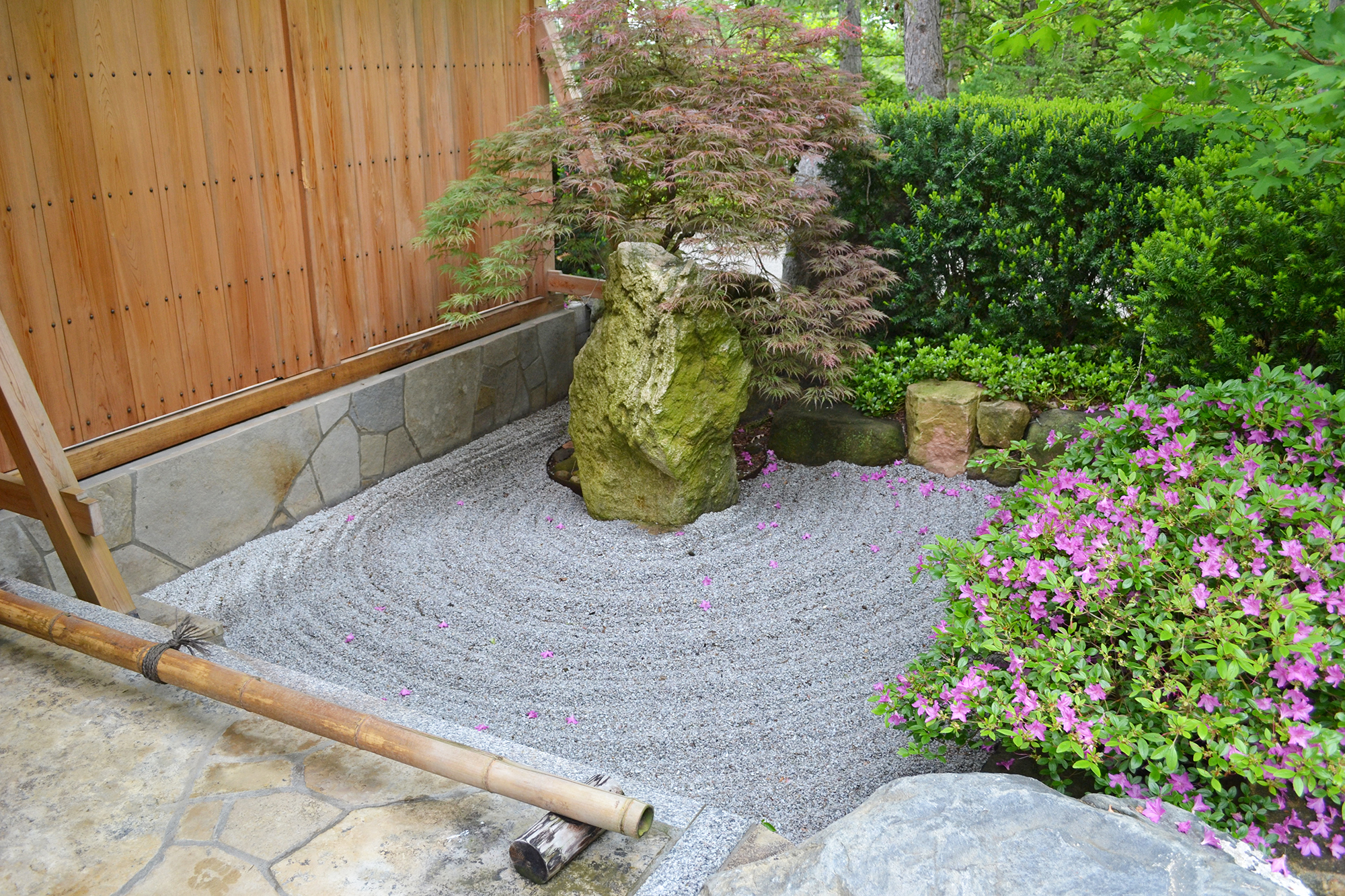
'One way to bring rock gardens to life is to include the Japanese practice of raking gravel to mimic water – called samon,' says Davin Eberhardt, founder of Nature of Home.
These zen gardens typically feature carefully arranged rocks, along with neatly pruned trees and shrubs, water features and moss. At the heart of this is a section of gravel or sand that can be raked as a mindful activity.
'Traditional Japanese gardens use a type of sand that is more like gravel, adds Davin. 'The larger size allows it not to be affected by wind and rain. But, you can use whatever gravel is available in your area of similar size.
'Flat river-rocks can also be leaned on one another to mimic the look of a flowing stream.'
Remember to put down a weed barrier before installing the stone.
7. Plant to attract pollinators
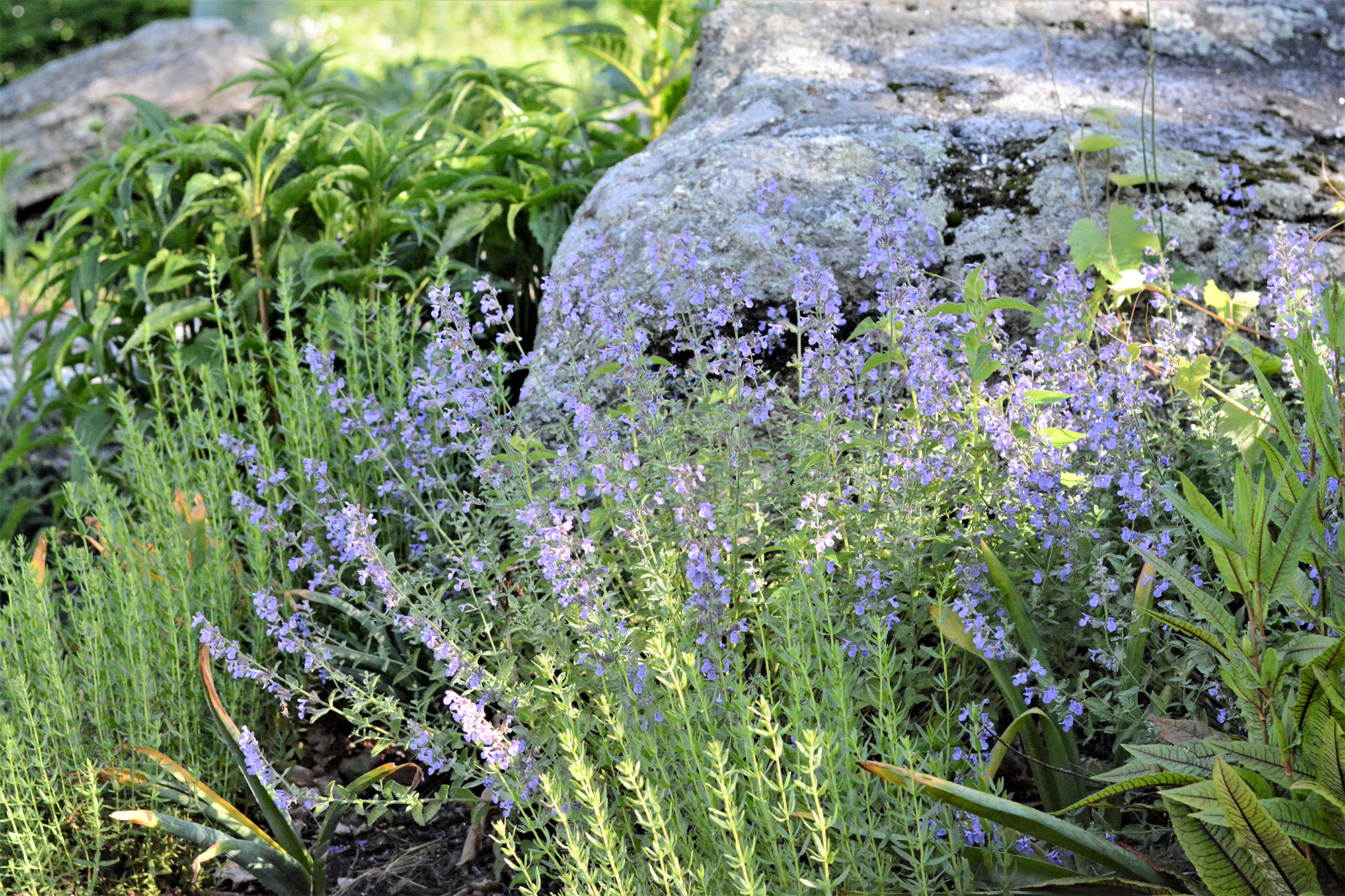
‘Using the often neglected rock wall and rocky landscape found in many backyards as a pollinator and beneficial insect habitat has many great benefits,’ says Marjorie.
‘The plants I use in my own rock garden and along my rock wall are all native plants and are chosen specifically for their uses in providing habitat to beneficial insects as well as a food source for pollinators.’
Good options include easy-care plants like catmint, which provides summer-long blooms and ample nectar for pollinators.
Yarrow's lacy foliage is attractive to both us and pollinators, providing a perfect habitat for ladybugs, while its tiny umbel shaped blooms attract many species of native bees and pollinating wasps.
‘It grows fast and can spread aggressively, so be careful where you plant it as it can overtake more delicate plants,’ says Marjorie, who also recommends echinacea, blue hyssop and bee balm.
8. Use a rock garden to add privacy to a seating area
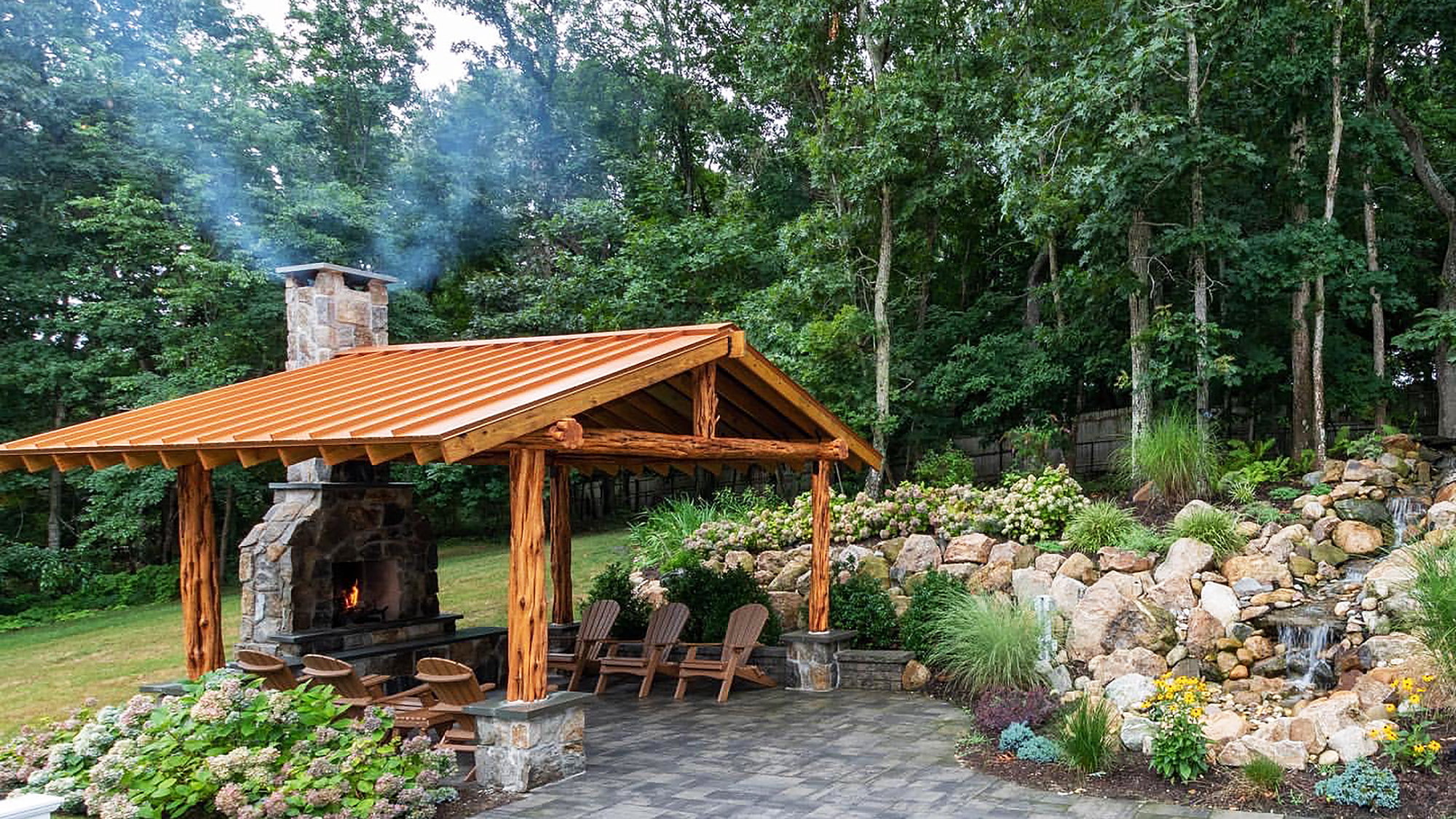
If you're looking for rock garden ideas that will also serve a practical purpose, then consider creating a rockery that will act as a surround to an outdoor seating area.
Not only will this make the space feel like a calmer place to relax, but it will also help to reduce wind chill in an exposed site.
In this stunning design by Delgado Stone, an outdoor fireplace has been created to complement a large rockery incorporating a zen water feature.
'Natural stone requires very little maintenance, which will help save on landscaping costs, and it's durable so it will not need to be replaced,' says Mike Wolfe, the brand's chief operating officer.
'When done properly a rock garden adds beauty and ease to any property, and will also add value.
'An ideal rock garden will be centered around a stone that is already in place on the property. If that is not an option, then select stone you will like looking at for a long time and that will look good even as the home or property changes.'
9. Plant an aromatic lavender rockery

Lavender is one of the best plants to add to your rock garden ideas as it is hardy, low maintenance and thrives in poor soils.
As a Mediterranean plant, it is naturally acclimatized to rougher, drier landscapes.
Its fragrant purple flowers also stand out beautifully against stone and are highly attractive to precious pollinators including bees and butterflies.
Learning how to grow lavender is easy – it rarely needs watering or fertilizing, and only needs an annual prune to keep in shape.
10. Choose a feature stone
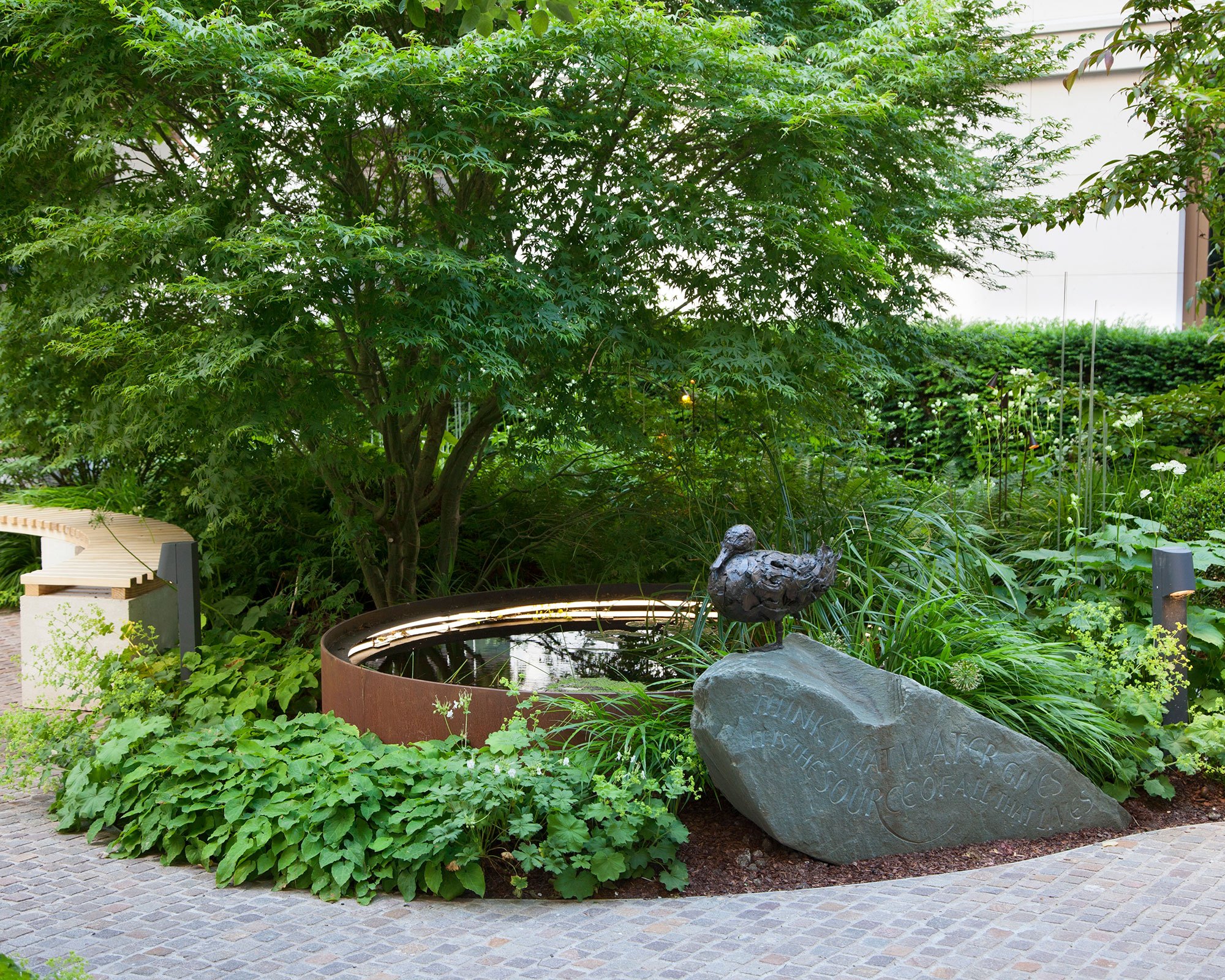
When planning your rock garden, consider the effect just a single sculptural rock can create – particularly when teamed with statuary or a water feature.
Bear in mind that all stones are not alike – consider the different textures and colors, and the effect that will have on your garden.
Water-worn limestone is currently very popular, and when laid by an expert this produces really beautiful effects.
There are great advantages in using local stone, especially when considering landscaping cos,. It is almost certain to harmonize with its surroundings, but care must be taken to see that it will withstand wet and frost without crumbling or flaking.
11. Plant succulents for an architectural element
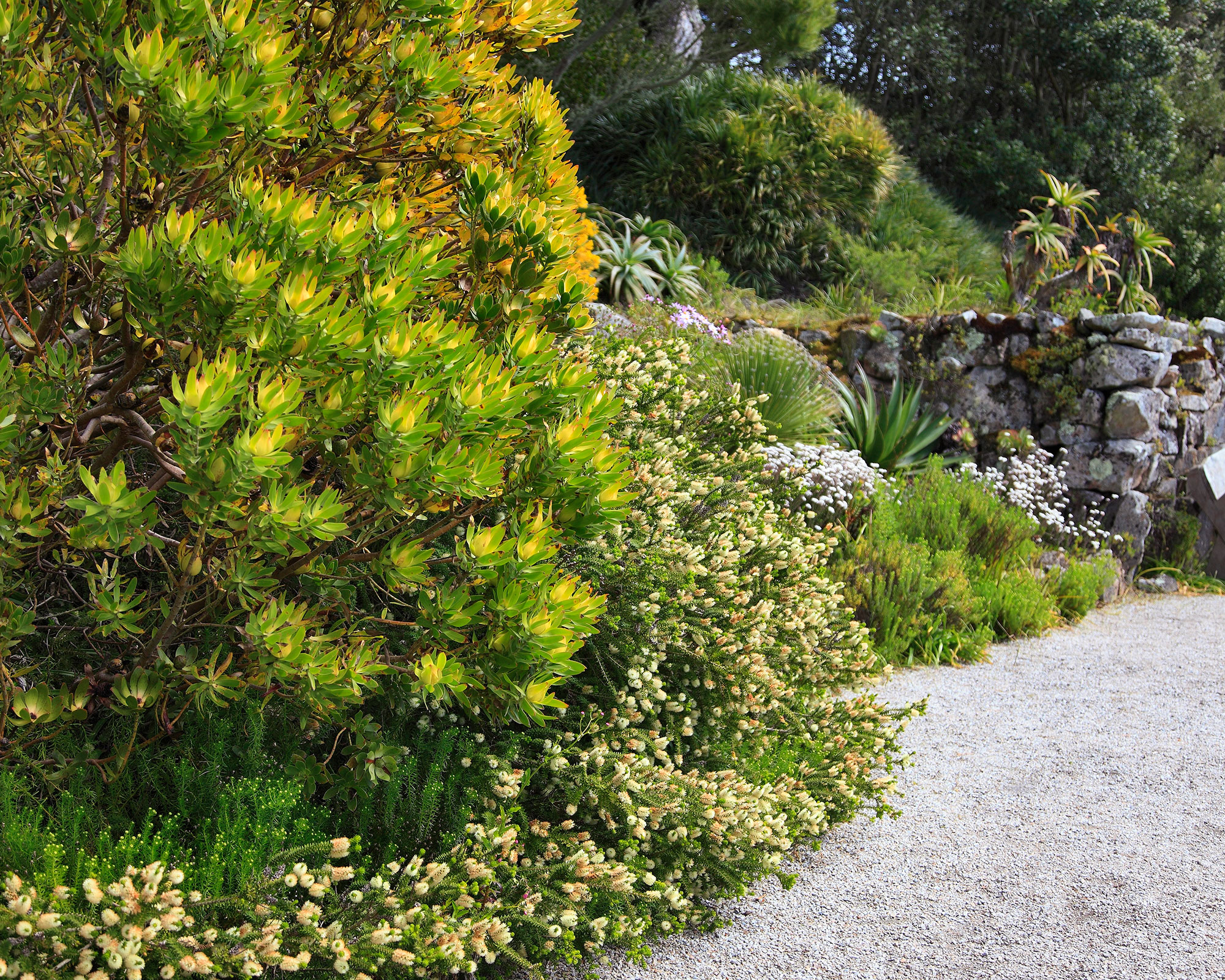
Plants are pretty amazing things, and none more so than succulents, which have adapted their structure to hold on to water so they can survive in inhospitable dry conditions, extreme heat, and with very little maintenance.
This plant group is a diverse as it is fascinating, including the likes of aloes, cacti, houseleeks and agaves. Most succulents use their fleshy leaves to store water, but some also use their stems and roots, and the leaves tend to be thick and waxy to reduce evaporation.
Look for succulents that are borderline hardy, like Aloe striata. If your garden is frost-free you should be able to grow these outdoors all year round. But don’t worry if this isn’t the case – lots of succulents, such as houseleeks and sedums, are similarly hardy.
Excess water can be a problem, so whether you are planting straight into the ground or using raised garden bed ideas in your rockery, you’ll need to improve drainage amongst the rocks by adding plenty of grit and gravel.
12. Invest in hardy 'seaside' plants
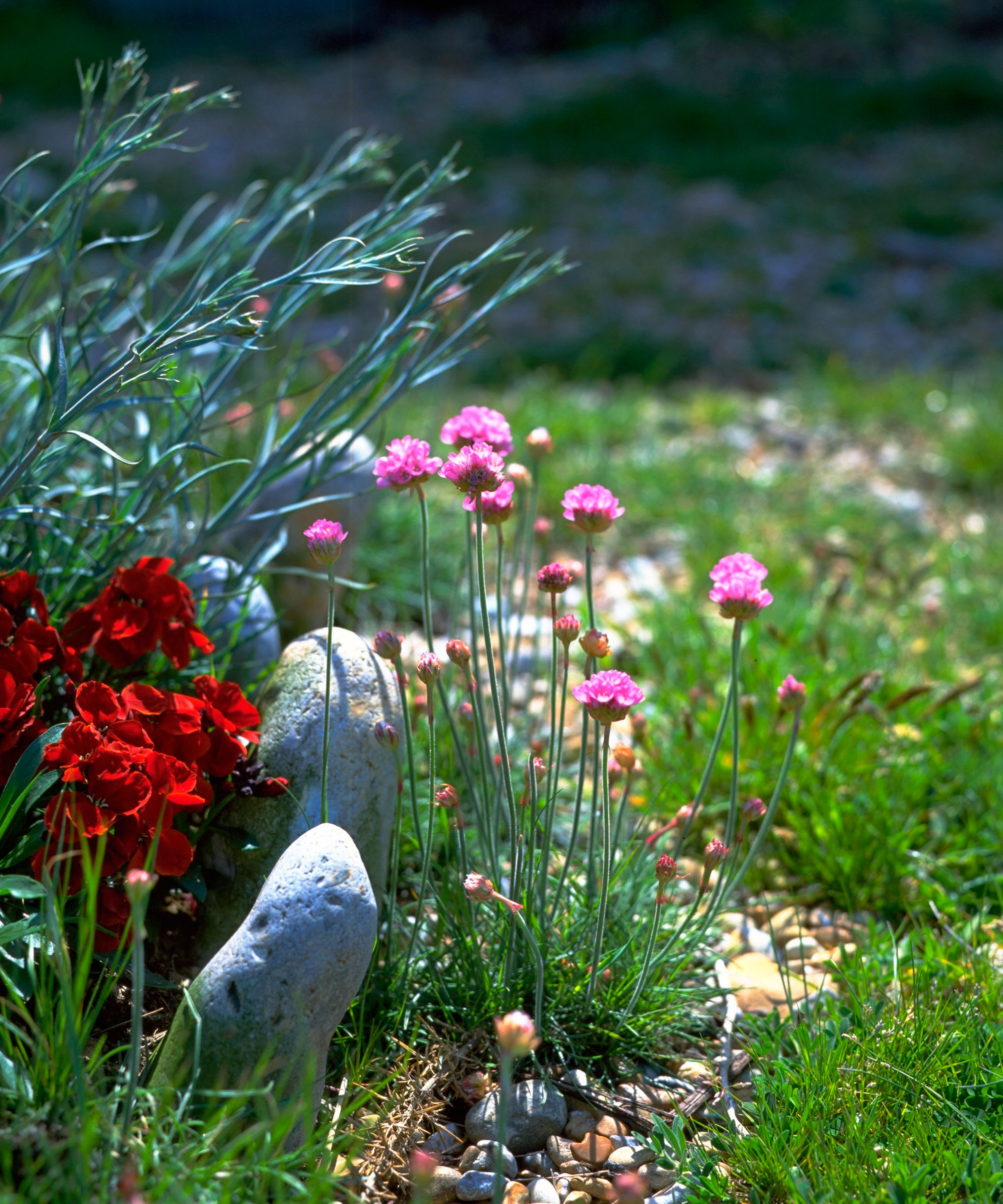
Plants that thrive on the coast are tough and exceptionally hardy, therefore they make the perfect addition to rock garden ideas.
Gardening by the sea presents particular challenges – gale-force winds, salty air, bright light and poor soil conditions. The plus points of coastal growing are that maritime plants tend to be drought-tolerant and untroubled by pests and diseases, useful if you are planning a dry garden.
'Hardy seaside flowers will beautifully adorn a rock garden. They will provide a variety of colors and interesting textures to embellish the surroundings,' says Jason White, CEO of All About Gardening.
'Flowers that thrive in coastal conditions will also survive similar tough conditions in a rock garden, meaning they have the same drought-tolerant and sun-loving characteristics.
Hydrangeas, lavenders, and portulaca are hardy seaside flowers that are drought-tolerant and thrive in sandy, well-draining soils.
'Their subtle colors and dainty beauty are a great contrast against rocks.'
13. Plant ornamental grasses in your rock garden
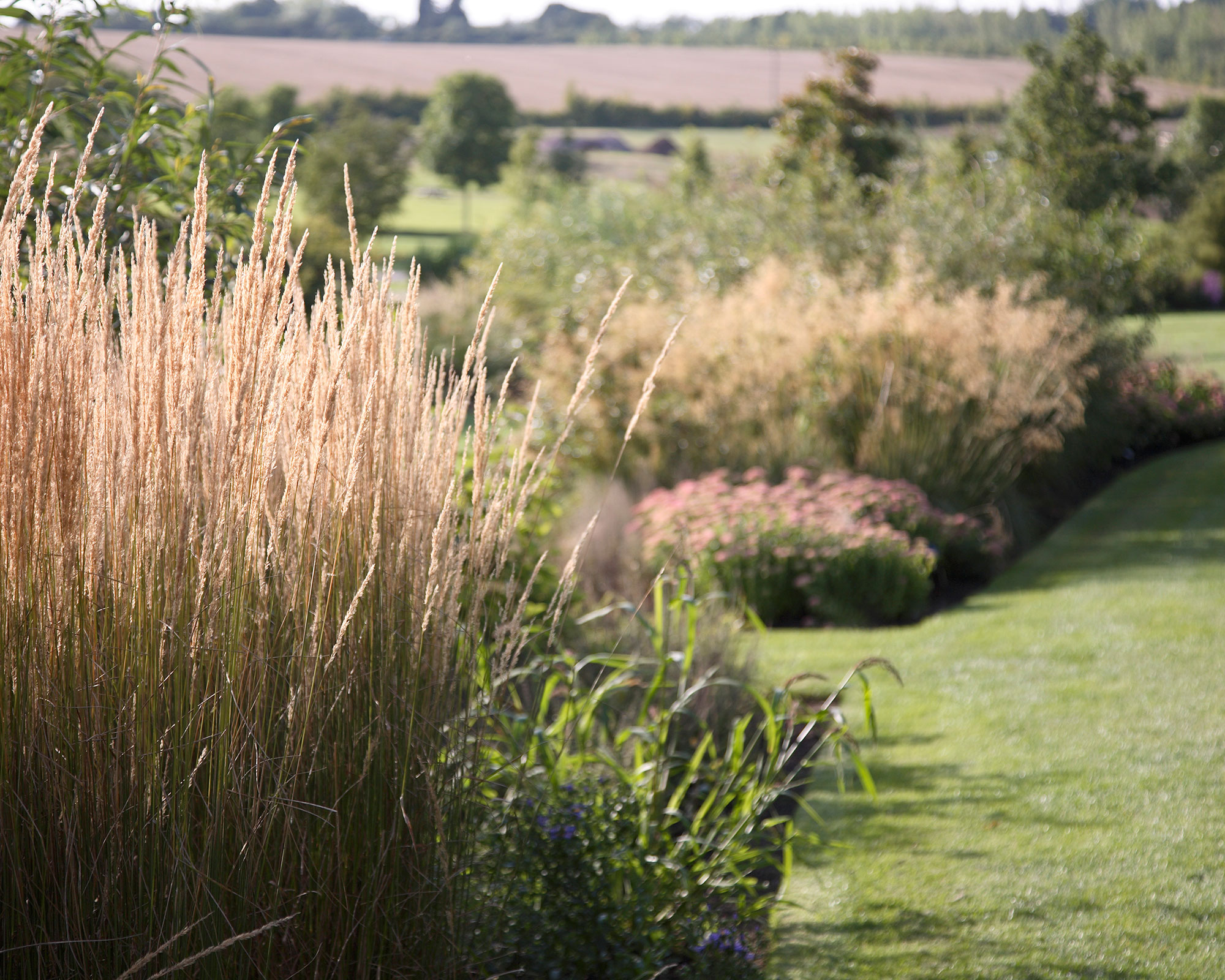
Ornamental grasses fit into any garden style adding grace, texture and movement to garden border, and if planted en masse they bring a delightful musical note to the garden when they rustle in the wind.
They also work equally well in rock garden ideas, creating instant interest and drama among the rocks.
When planning how to grow ornamental grasses, think of using them to fill gaps that are emerging, or combining them with late-flowering perennials such as sedum, asters and any stems of Verbena bonariensis.
Alternatively, put those with showy, evergreen foliage to good use by weaving them in between plants with bold architectural outlines.
14. Embrace the unkempt look of a moss garden
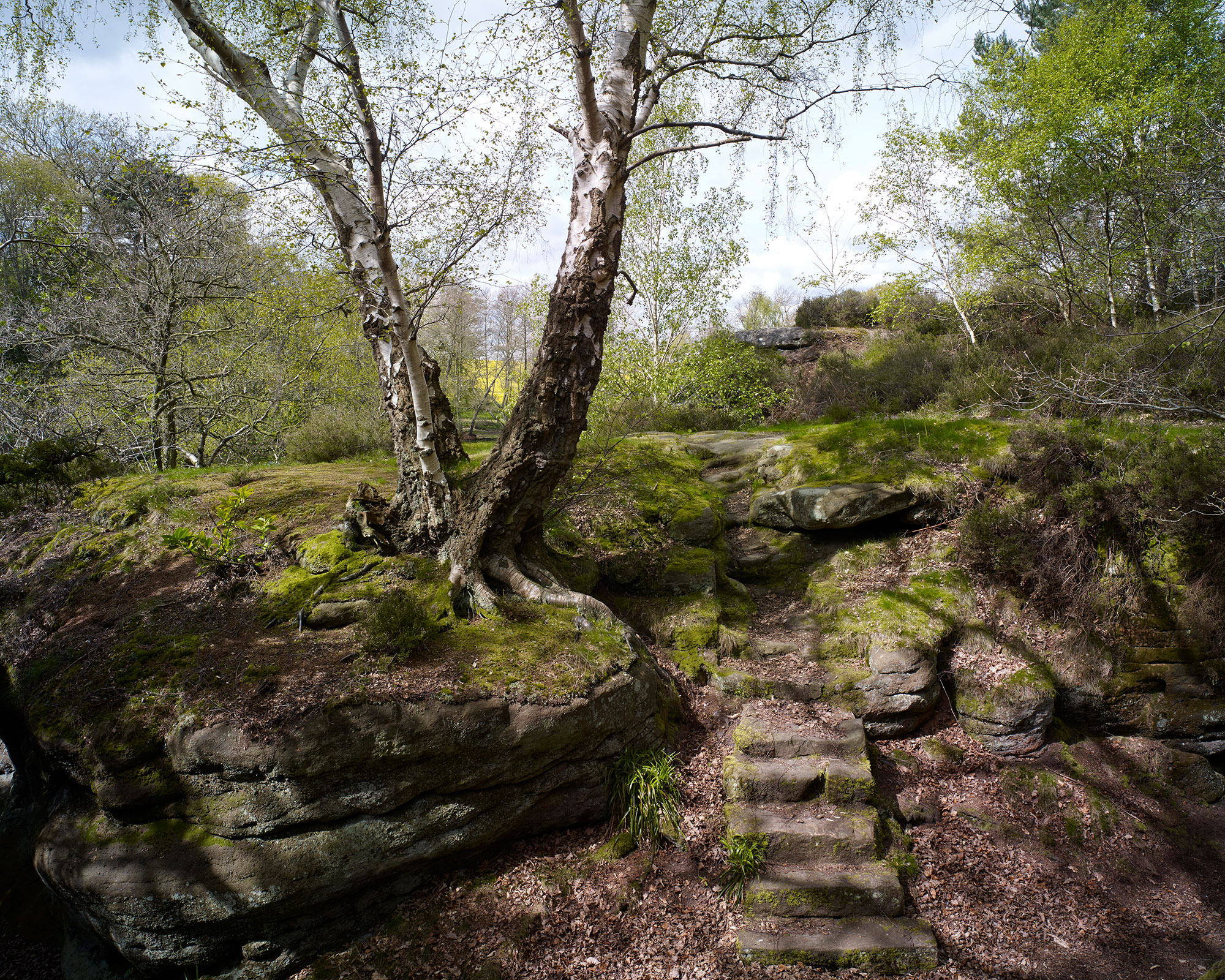
Inspired by serene botanical Japanese garden ideas, the mossy rock garden is set to be the latest trend for solving problems with patchy, yellow grass and overgrown lawns.
In fact, many argue that moss is fundamentally better than grass, plus it does an amazing job of cleansing the air of pollutants.
Moss gardens are also more eco-friendly, lower maintenance and durable, and while it's not the traditional Western way to garden, it is gaining credence.
‘Moss gardening is traditional in Japan and has been very popular in North-West and North America,’ says Guy Barter, chief horticulturist at the Royal Horticultural Society.
15. Create a natural appearance with boulders – the Japanese way
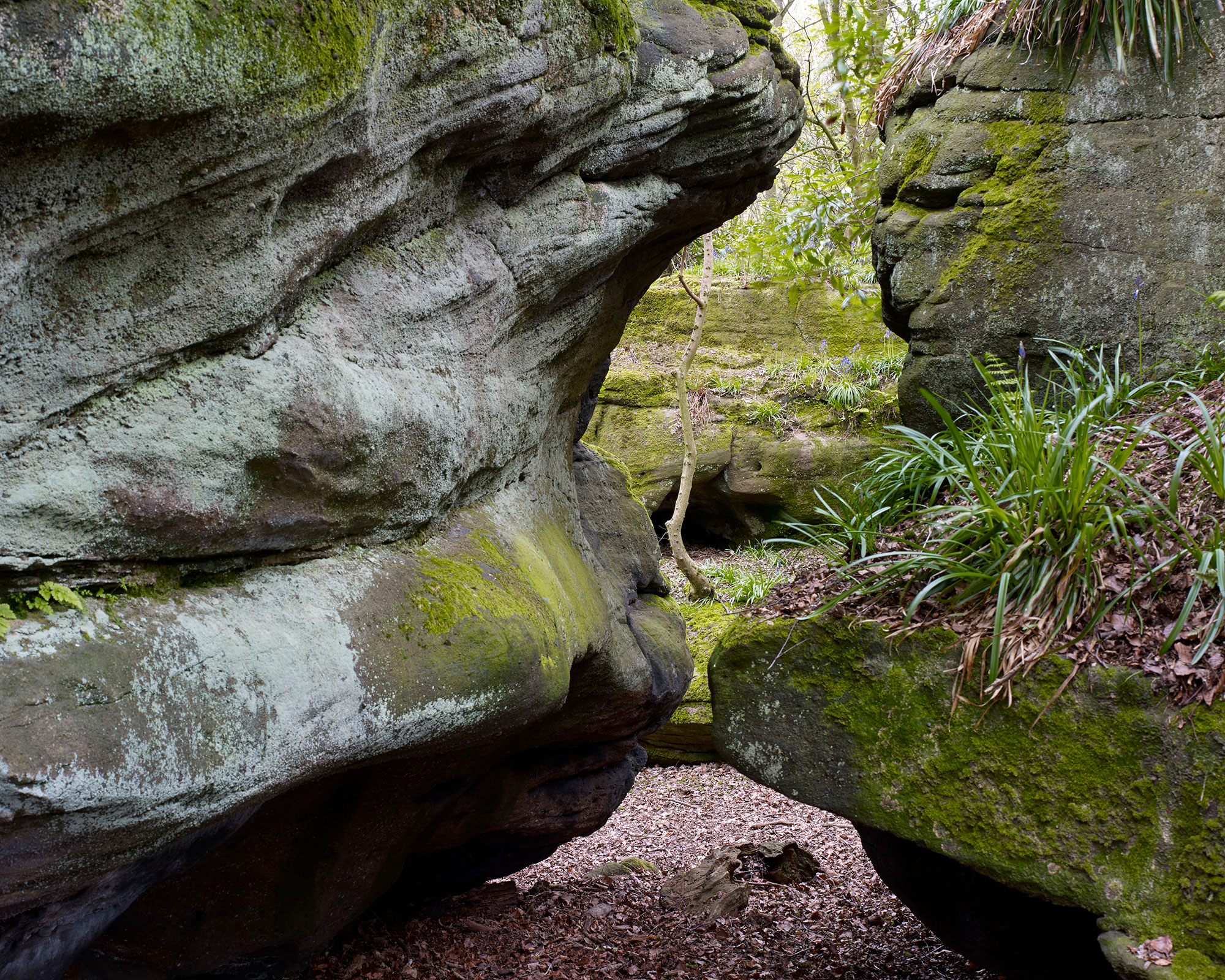
In traditional Japanese gardens, rocks, stones and oversized boulders are used to create islands, cliffs and mountains that can also act as garden shade ideas, and their shape and placement call for great expertise.
What you don’t want is too much uniformity or consistency; quite the opposite in fact. The best stones are ones sourced from nature.
To make your own natural rock garden, look to riversides, in the forest, or by the ocean for stones with the right kind of shape.
16. Get ahead with alpines
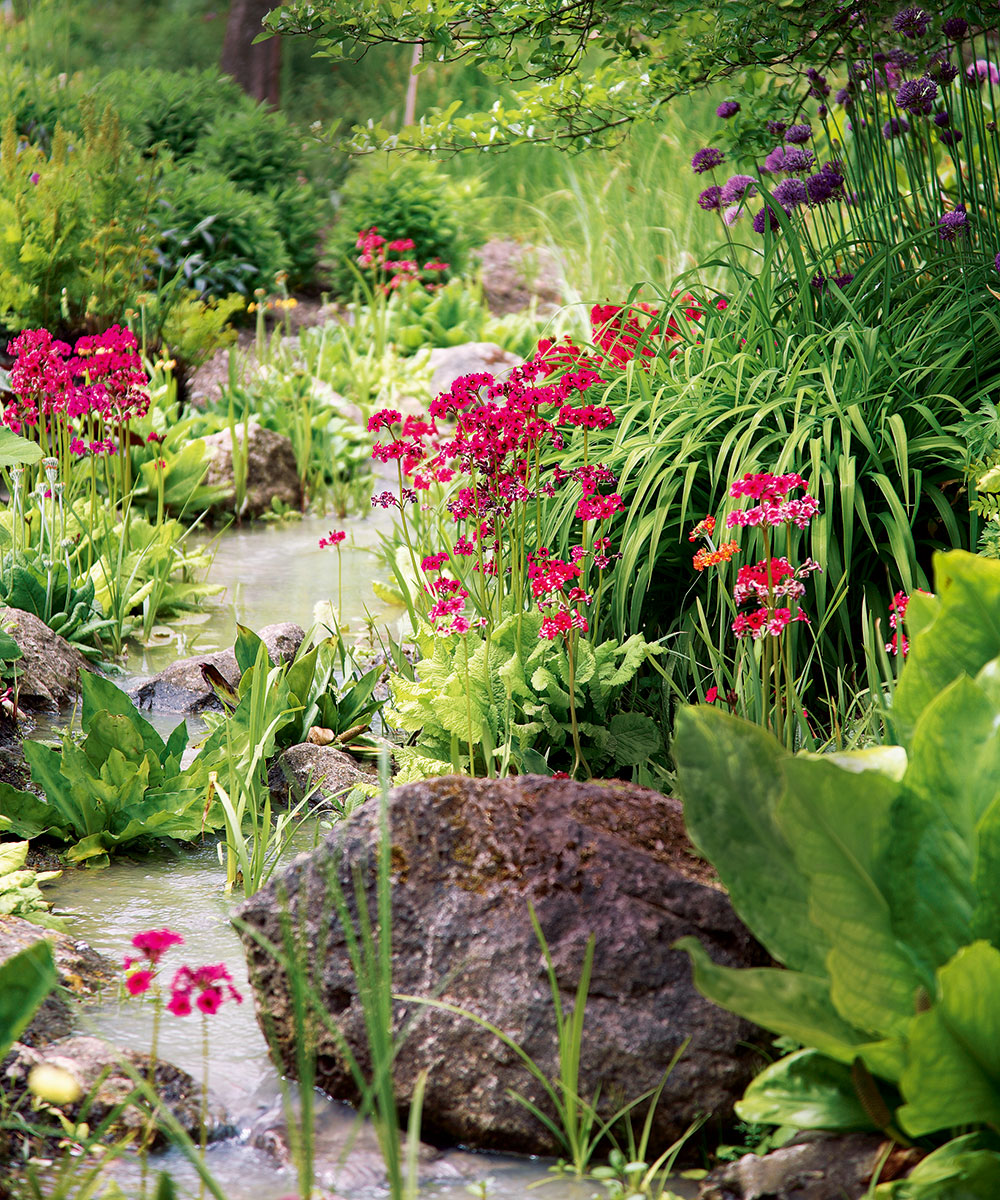
Alpines are a good choice for younger gardeners: their Thumbelina-scale – along with the variety of shapes, textures and colors – seems to fascinate children.
Alpine plants have contributed to miniature landscapes for years and they’re having a revival.
The majority of alpine enthusiasts use rock gardens replicating their natural habitats to grow these mini mountain plants. Since the 1980s rockeries have been out of favor with less committed gardeners, as they have gained a reputation of being fussy and old-fashioned.
But as gardens are getting smaller, it could be time to take a fresh look at this past trend and take inspiration from the alpine landscape in our small garden ideas.
Easy alpines can be acquired from garden centres and the most popular ones include primulas, thymes, saxifrage, pulsatilla, sedums, campanulas and the dainty maiden pink Dianthus deltoides. Shrubby alpines like Daphne alpine and Hebe buchananii can be used to add height.
17. Ace your layout
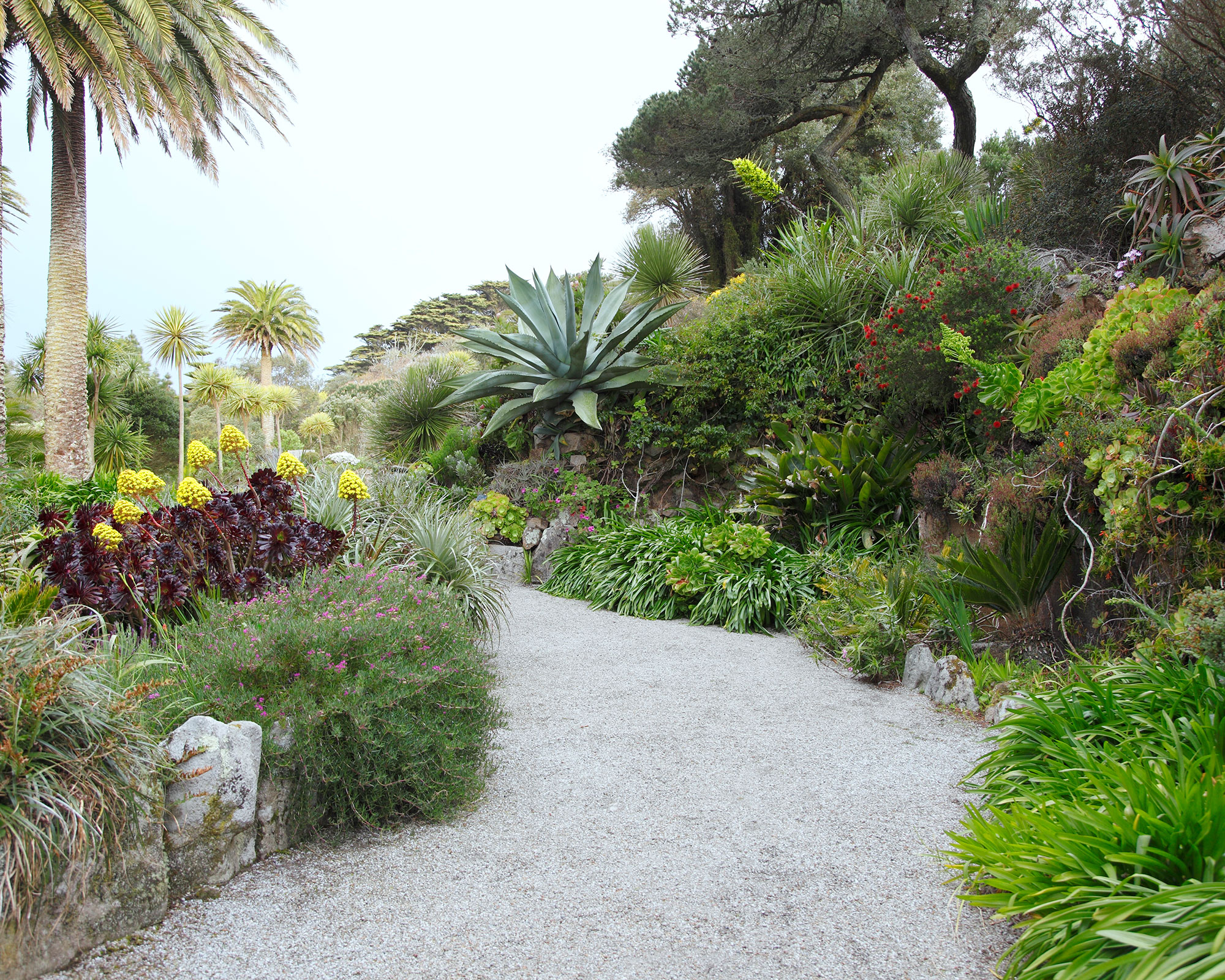
When arranging plants, choose taller plants for the back of the rockery – perhaps taking inspiration from tropical planting or Mediterranean garden ideas – scaling down in size to smaller plants at the front
After planting, top dress bare soil between the rocks with a layer of grit or fine gravel. This trick will help keep rain from washing muddy soil on to the plants and stop them from rotting around the crown.
18. Introduce an element of water
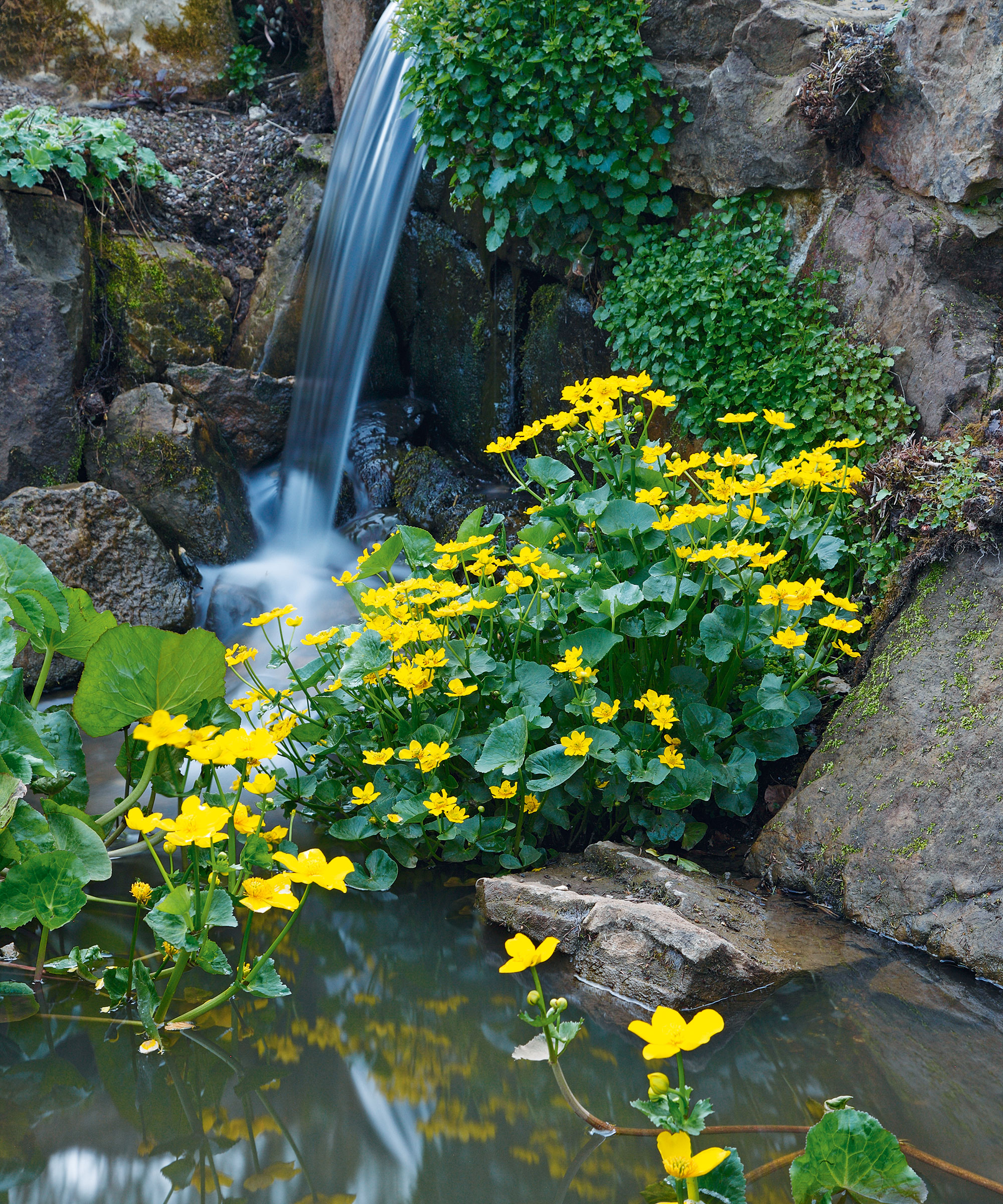
Creating a water feature or pond around a rockery brings something really special to the garden, encouraging wildlife and offering the opportunity to introduce new foliage.
For planting, specialist water garden designer Anthony Archer-Wills advises considering elements of vertical garden ideas too: ‘Aim for large, bold climbers with strong foliage contrasts that look effective from a distance.
'For example, plant the white bulrush, Schoenoplectus in subsoil, taberneumanni ‘Albescens’, with blue pickerel weed, or the beautiful blue Iris laevigata ‘Dorothy Robinson’.
'The key is always to mimic the natural arrangement of weathering seen in nature,’ says Thomas Freeth, of the Royal Botanic Gardens, Kew.
19. Get the basics right
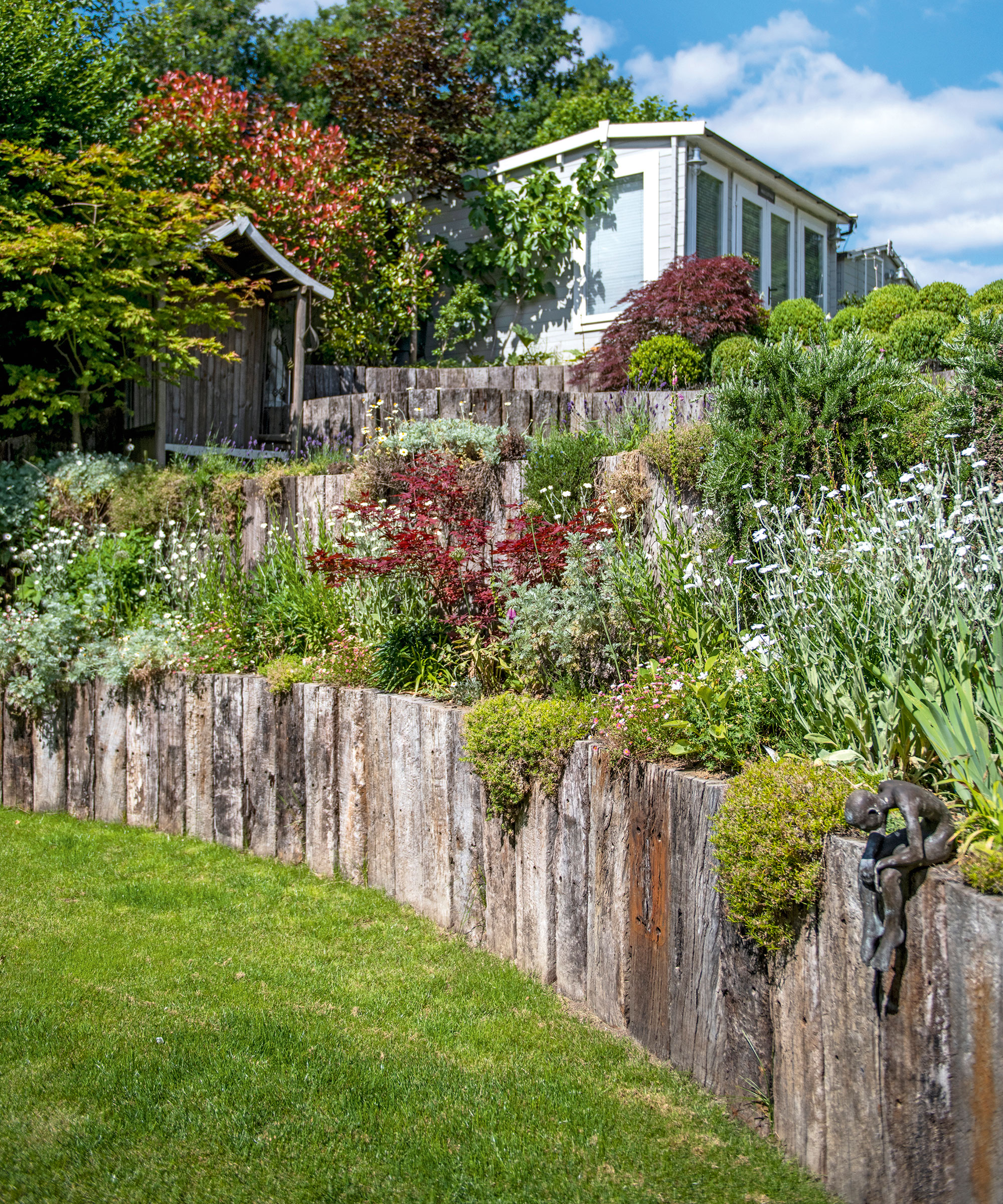
Given the right setting and some creative thought, a rockery can become your garden’s most stunning feature. A free-draining site and sunny aspect is best for most alpine plants, so a south- or west-facing site that is well clear of overhanging trees is ideal.
You can also create a rugged hillside effect by incorporating a rockery into your sloped backyard ideas.
Use stone or a soft, porous rock, such as limestone or sandstone, as over time these rocks will weather into interesting shapes and resemble the sorts of rocky outcrops found in nature.
Select rocks carefully, looking for flat, rough-shaped ones. It’s best to use large rocks, as ones that are too small ruin the effect and can make a soil mound look like a plum pudding.
20. Create a small rock garden
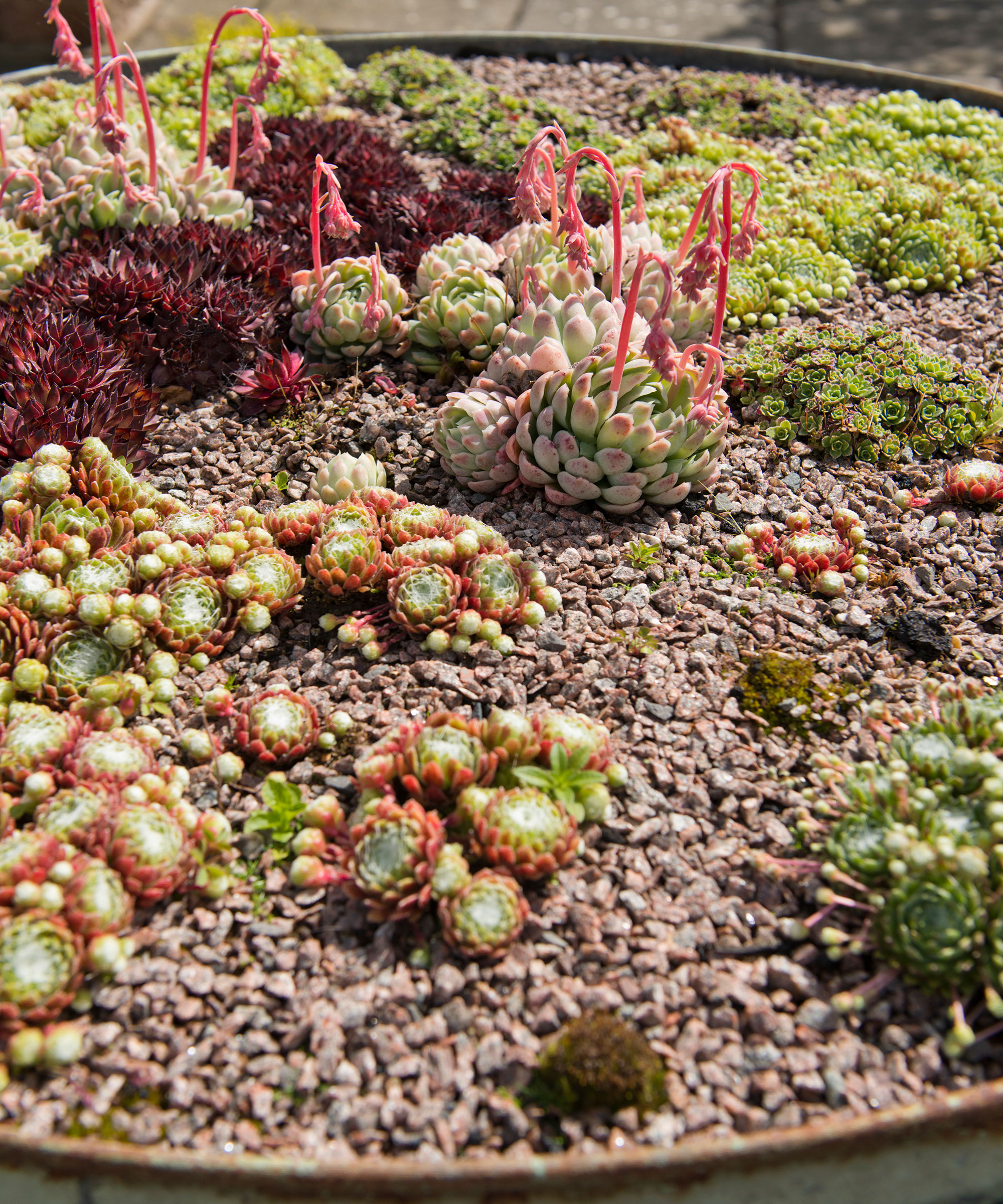
Rock garden ideas are not only reserved for large, expansive spaces. Recycle old basins and pails, and use plant pots to create a minimal landscape that will sit perfectly in a small space, even as part of grassless patio ideas.
Simply choose rock garden plants – succulents, cacti, and miniature bulb plants like the Japanese iris and daffodils – and scatter gravel or small pebbles around the plants. Then, display your miniature rockery on a table, patio or balcony garden.
How do you make a rock garden?
Chris Bonnett, gardening expert at Gardening Express, says: ‘Rockeries are easy to build from scratch and can be designed to fit in any garden.’ However, there is some light preparation that should be done first.
‘To prevent unwanted shoots from popping up in your rock garden, dig up any organic material like weeds and grass,’ Chris says. ‘Once the space is clear, set about laying out a perimeter of rocks as your rockery base.’
Once that’s done, all the fun of arranging, planting and experimenting with garden decor ideas can begin.
To be entirely satisfactory, rock garden ideas must appear natural in relation to their setting. A rockery must be well proportioned; it must also be constructed so as to suit the plants which are to adorn it, and it must be suitably situated with regard to the proportions of the gardens and the house.
Think about how rocks look in nature – and then try to recreate this in your garden. That means avoid arranging rocks in straight lines, for starters. Instead, go for clusters of various sized stones in a similar color.
What do you put in a rock garden?
'Rock gardens can serve as a canvas for planters, sculptures, fountains, and certain plants to amplify your backyard and bring life to your home in general,' says Mark Feldman.
There is a wide choice of plants available that will work in a rock garden, but you must consider your local climate and how much work you are prepared to put in.
'Plants that work well in a rock garden include those that do not require much watering and can sustain themselves in direct, hot sunlight, as well as in freezing temperatures,' adds Mark.
'This includes cacti, aloe plants, and other tall grasses that are native to mid-western states like Arizona and New Mexico.'
How do I start a small rockery?
‘Rock gardens do not have to be on a grand scale or include monumental works of earth and stone,’ says Thomas Freeth, rock garden supervisor at the Royal Botanic Gardens.
Rockeries can even be incorporated into the smallest of front garden ideas, like this tiny rockery tucked in beside the front door.
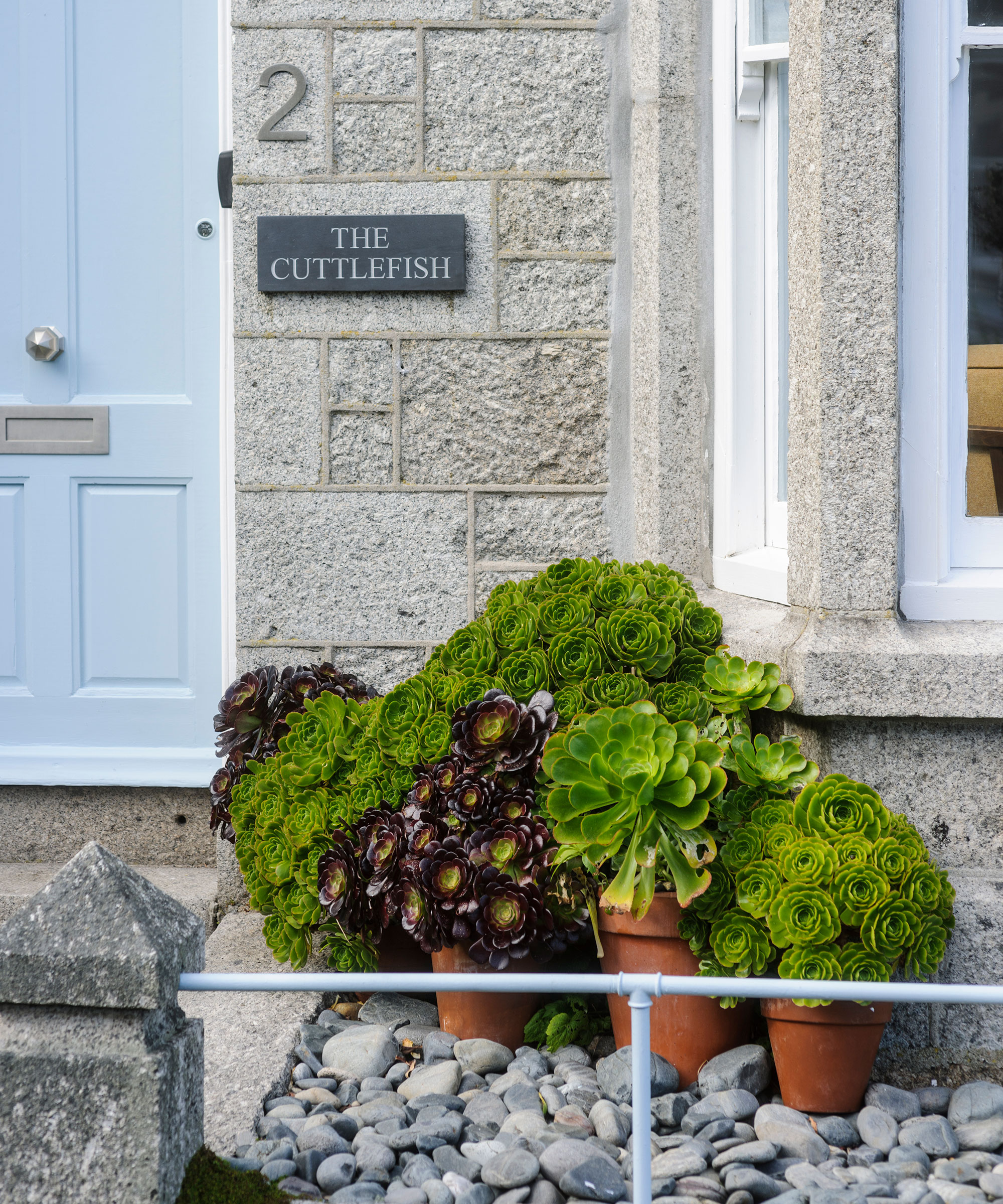
Freeth also has some advice if you are planning a small garden rockery: ‘A small bank in a garden or even a good stone or concrete trough will do. However, all rock garden ideas will need good drainage and a permanently aerated substrate, to facilitate the long, searching roots that these plants require.’
When it comes to the materials, ‘local stone in all shapes and sizes, building aggregates and even recycled bricks or reclaimed material can all be tried,’ says Thomas.
‘As long as they are inert and allow for air spaces in the rooting environment that won’t close up over time, they are good.’

Jennifer is the Digital Editor at Homes & Gardens, bringing years of interiors experience across the US and UK. She has worked with leading publications, blending expertise in PR, marketing, social media, commercial strategy, and e-commerce. Jennifer has covered every corner of the home – curating projects from top interior designers, sourcing celebrity properties, reviewing appliances, and delivering timely news. Now, she channels her digital skills into shaping the world’s leading interiors website.
- Melanie GriffithsSenior Editor of Gardening Know How